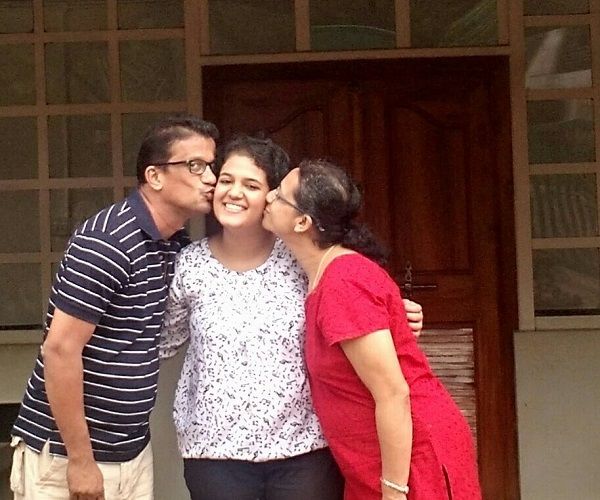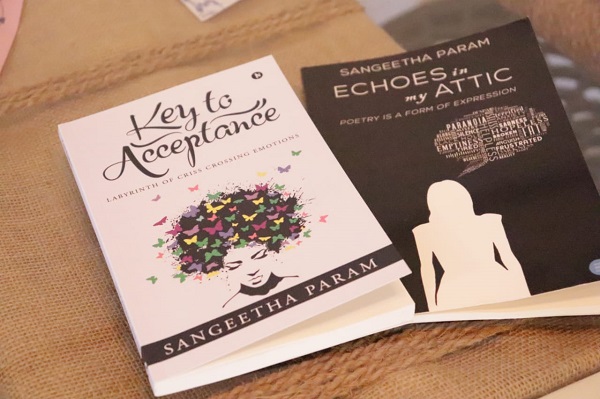
Sangeetha Param, a 24 year old living with bipolar disorder and depression, is a successful employee, has authored two books and is no longer afraid to talk in public about her mental health issues. Read her reflective piece.
"I have bipolar disorder and borderline personality disorder”.
“Do you know what they are?" I ask.
The general responses are –
- "I don't know".
- "They are just mood swings, right?"
- "I have the exact same thing".
- "I know what you are talking about. I read it online that it's a mood disorder."
I wish I could put a big bracket to these answers and put an 'X' mark and say, "These are mental illnesses and they do not just comprise of mood swings."
Coming face to face with my depression
I stepped out of home one November morning in 2014 with a game plan. The plan was to kill myself. To return home as dead, to be brought back as a body without a soul. My last wish was to speak to my father. I called him up hesitatingly. Honestly speaking, if you ask me why I did that, I still wonder. But I am glad I did it. I called my father and began crying uncontrollably on the phone. The bottled up emotions of pain, anger, agony, discomfort of 20 years began erupting from the volcano of my heart.
At that moment, I, Sangeetha Param, came face-to-face with my depression, depression as more than just feeling sad. I knew all along I was suffering from depression for a long time because no matter what I did, no matter whom I spoke to I did not feel relieved or comforted. I knew I was getting engulfed by my depression. I had reached the end line where one is pushed to contemplate suicide. Thankfully, I had my father at the other end of the line.
Suicide Prevention Helplines in India
Suicide Prevention Helpline in Singapore

My father, my anchor
My suicide attempt shocked my family. At home, when I confessed to my father I had self-harmed, I hated myself, that I was sad all the time and did not want to live, he knew it was much more than just sadness. Being a son of a mother with schizophrenia, my father understood that this needed intervention. He decided he would do all to help his daughter restore her mental health.
My father identified various doctors, specifically psychiatrists and counsellors, for my treatment and medications. My mother sat every night crying to my father, "What did we do wrong for this girl to suffer?" Thousands of questions followed by guilt are the usual reaction of families on diagnosis of mental illness of their loved ones. It is one of the reasons why I was silent and secret about my mental health. I didn’t want my family to be heartbroken.
When I was diagnosed by the doctors as a patient of depression and bipolar disorder, I was relieved because now I began to understand why everything was happening to me, why I felt what I felt, why I was suffocating myself in self-blame and dejection. It was a bigger relief when my family came to terms with my mental illness. It gave me courage to accept it too.
I had been prescribed a heavy dose of medicines. Not one or two but eleven. Slowly, things started getting better. I was also undergoing psychotherapy which helped me.
I felt my whole experience as a journey, where I was like a broken down vehicle. I felt I needed a lot of people to push me to help me get started. You have your first circle of supportive family, therapists, doctors, medicines and, over and above, myself. My family is battling my depression with me. They undergo counselling as well. They need to know how to handle things not for the patient but for themselves, as it can be very taxing.
Support from my office colleagues
At work, when I began to take long leaves, sometimes without pay, it began to raise questions in the minds of people. One day I came to work to submit a long leave letter stating I was suffering from depression. The reaction I got was surprising as they told me to continue coming to work and they would take care of me and provide every support I needed. I work for a reputed organisation and the employees are appreciative of my diligence and performance. My depression came out during the beginning of my career and, thankfully, I received all the backing from my office.
I always wished I knew I had bipolar, mainly because I wouldn't have been so hard or harsh on myself. There is a lot of ignorance about depression and bipolar amongst people. Many of my friends equate depression with sadness and bipolar with a bit of mood swings. This partial, half-baked knowledge and understanding makes it difficult to make real friends.
I also have BPD
I also suffer from Borderline Personality Disorder (BPD). It is a mental health disorder which is very environmental and situation based. It affects our inter-personal relationships as we don’t know how to maintain good relations as we tend to get too clingy or we run away from commitment. Self-harm, anxiety, paranoia all comes under BPD. For BPD therapy is the only solution. There is no medication which tells us how to deal with people and situations.
I still face a lot of challenges but I learnt the best way to overcome anything is acceptance. Hence, I made my weakness of mental illness into my strength by talking about it publicly. I stand up to a crowd and I speak with confidence that I am depressed, having bipolar and that I self-harmed. Just speak the truth and be non- judgemental towards yourself and others. I get a lot of feedback that I speak depressive things but I know that at least one in the crowd will have the thought - "I know what she is talking about" - running through his/ her brain.
Acceptance - It is ok to be not ok. A proud bipolar
I started writing and I published 2 books –
- Key to Acceptance
- Echoes in my Attic

The biggest challenge for me right now is scrolling down my Whatsapp contact list having no one to speak to. It is only the people with mental illness who can understand the other. When people say they are depressed or sad, sometimes I fail to grasp their sentiment. Because I know they are referring to it in a very casual way. They are not experiencing what I am going through. For example, my father is a cancer survivor. No matter how much I try to empathise I will never know what he underwent, the pain during chemotherapy, the battle with death. Similarly a person who his undergoing a mental illness can only truly understand another person with a similar illness.
It is scary not knowing what I would be feeling the next minute but having a judgemental environment makes things hard. Facing every day is a challenge and I wake up every morning not having any expectations of how the day will turn out. I take things as they come.
Surviving a life with a mental illness is challenging. Very few people who understand the brain know what a mentally ill person undergoes.
Acceptance is one word I have which will summarize my story to one word.
My motto is - It is ok to be not ok. Hence, I am a proud bipolar.






